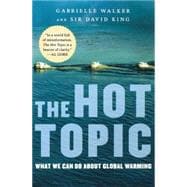
Note: Supplemental materials are not guaranteed with Rental or Used book purchases.
Purchase Benefits
What is included with this book?
| Preface | p. ix |
| The Problem | |
| Warming World | p. 3 |
| Whodunnit? | p. 19 |
| Feeling the Heat | p. 32 |
| In the Pipeline | p. 47 |
| Climate Wild Cards | p. 64 |
| Technological Solutions | |
| What Should We Aim For? | p. 81 |
| More from Less | p. 97 |
| Planes, Trains, and Automobiles | p. 110 |
| Power to Change | p. 126 |
| Political Solutions | |
| It's the Economy, Stupid | p. 147 |
| The Road from Kyoto | p. 166 |
| Rapidly Developing Nations (or, come on in, the agreement's lovely) | p. 178 |
| Industrialized Nations (or, whose fault is it anyway?) | p. 188 |
| How You Can Change the World | p. 214 |
| Acknowledgments | p. 229 |
| Climate Myths, Half-Truths, and Misconceptions | p. 231 |
| Selected Glossary | p. 241 |
| Notes | p. 245 |
| Index | p. 267 |
| Table of Contents provided by Ingram. All Rights Reserved. |
The New copy of this book will include any supplemental materials advertised. Please check the title of the book to determine if it should include any access cards, study guides, lab manuals, CDs, etc.
The Used, Rental and eBook copies of this book are not guaranteed to include any supplemental materials. Typically, only the book itself is included. This is true even if the title states it includes any access cards, study guides, lab manuals, CDs, etc.
Excerpted from The Hot Topic: What We Can Do about Global Warming by Gabrielle Walker, David King
All rights reserved by the original copyright owners. Excerpts are provided for display purposes only and may not be reproduced, reprinted or distributed without the written permission of the publisher.